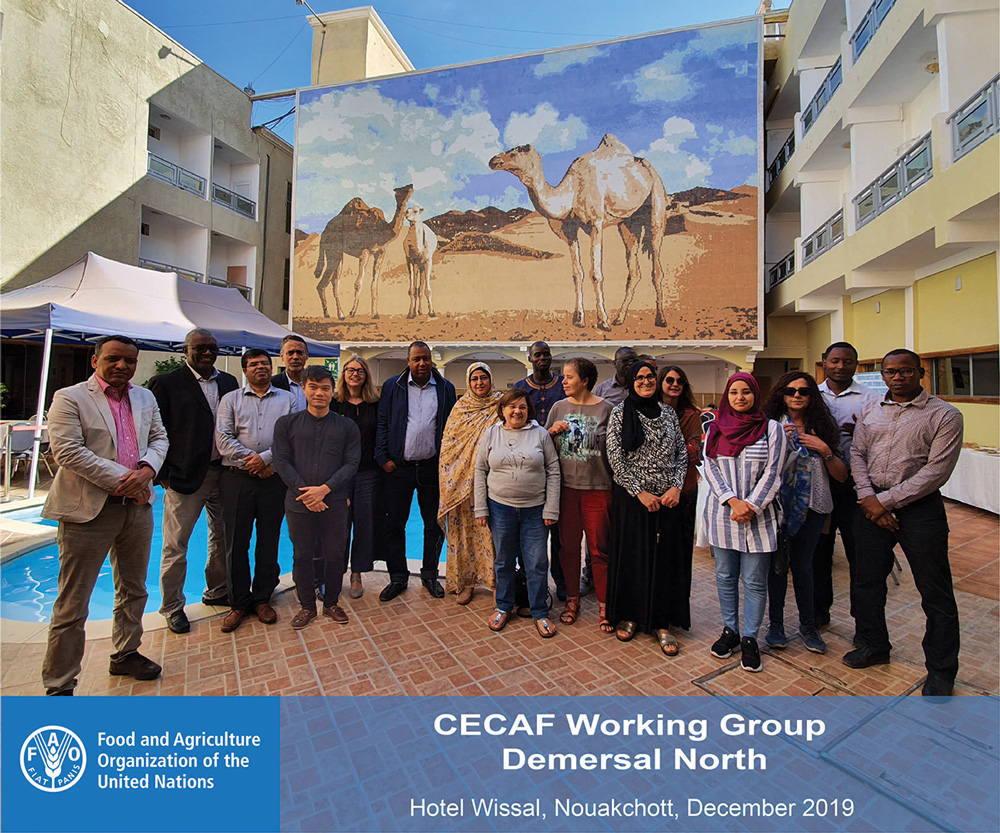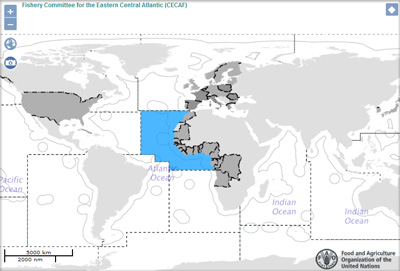CECAF Working Group (sub-group North) met in Mauritania to assess the current state of the region’s demersal species
*This news item is also available in French
The capital of Mauritania, Nouakchott, hosted the sixth session of the Fishery Committee of the Eastern Central Atlantic (CECAF) Working Group on the Assessment of Demersal Resources – Sub-group North- held from the 2nd to 10th December 2019. In total, 18 researchers from five countries in the sub-region participated in the event, along with FAO. Mauritania was represented by five scientists, one of whom is also the current Chair of the Demersal North Working Group.
 Participants of the 6th session of the CECAF Working Group in Nouakchott, Mauritania, 2019 © FAO Participants of the 6th session of the CECAF Working Group in Nouakchott, Mauritania, 2019 © FAO |
The objective of this meeting was to assess the current state of the region's demersal species (species that live and feed near the seabed) and formulate recommendations on fisheries management.
The meeting was opened by Mr. Mohamed El Hafedh Ejiwen, Director of the Mauritanian Institute of Oceanographic and Fisheries Research (IMROP), who welcomed the members to Mauritania, highlighting the importance of their work.
The first day of the meeting was dedicated to the planning of the 2020 surveys, conducted under the EAF-Nansen Programme, with the research vessel Dr Fridtjof Nansen. Ms. Merete Tandstad, the coordinator of the Programme, opened the event with a general presentation of the 2017-2021 research surveys, highlighting their importance in improving knowledge on fisheries management. Specific emphasis was given to the survey on Transboundary Demersal Resources and Ecosystems that will be carried out in the region from February to April 2020.
The research will focus on the shared demersal stocks. The expedition team will gather general knowledge on demersal species, collect samples of select species, as well as gather standard information on environmental conditions and on emerging issues, such as on the potential presence of micro-plastics and marine debris.
"The 2020 survey will be the first regional coverage of the demersal resources since the joint ecosystem survey with the CCLME project was conducted in 2012. We are very much looking forward to debating the findings with the region's scientists and fisheries managers at the next session of the CECAF demersal North Working Group," explained Ms. Tandstad.
The Fishery Committee for the Eastern Central Atlantic (CECAF) is a Regional Fishery Body and one of the main partners of the EAF-Nansen Programme. It also acts as the Regional Steering Committee (RSC) for the Programme. In this role, CECAF provides input on the overall implementation of the EAF-Nansen (i.e. planning and reporting) across the region; It also helps coordinate the Programme's activities with other ongoing regional activities. The Working Group on the Assessment of Demersal Resources was established by CECAF in 2000. It is divided into CECAF Sub-group North (between Cap Spartel in Morocco and the south of Senegal) and CECAF Sub-group South (between the south of Senegal and the Congo River). Until now, the Sub-group North has organized five meetings that took place in Senegal (2004); The Gambia (2007); Morocco (2010), and Spain (2013 and 2017). Another meeting also took place in 2003 (Guinea), jointly with the Sub-group South.
 Click to view CECAF area in the FAO Regional Fishery Bodies map viewer |
The overall objective of the Work Group is to contribute to the improved management of demersal resources in Northwest Africa through conducting stock assessments. Such analysis of the state of the fish stocks helps to determine whether they are: not fully exploited, fully exploited, or overexploited. The end goal of the Group is to support sustainable use of the resources for the benefit of the coastal countries. The Group's mission operates under a wider purpose of the Committee, which is "to promote the sustainable utilisation of the living marine resources within its area of competence by the proper management and development of the fisheries and fishing operations."
The EAF-Nansen Programme supports CECAF and its Assessment Working Groups in their important role to ensure that scientific advice is provided in support of sustainable fisheries in the region, including through the provisions of data, information and knowledge, gathered from the research surveys with the R/V Dr Fridtjof Nansen.
At the end of the meeting, updated information on the state of the 27 stocks, assessed by the Working group, and advice will be formulated for managers to act upon to support sustainable fisheries. While several management recommendations have been taken into account by the countries since the last meeting in 2017 and new information is available for some stocks, challenges still persist.
"It is very important that the region's scientists come regularly together to discuss data and the status of these important resources and share experiences, so that we can monitor how the stocks are developing and that their exploitation provides the benefit to the countries and communities depending upon them," stated Dr. Beyah Meisse Habib, chair of the working groups.
The results of the Working Group will be submitted to CECAF's Scientific-Sub-Committee for discussions and onward to the Committee for the final adoption.
The next meeting of the CECAF Group is scheduled for 2021 in Senegal.
